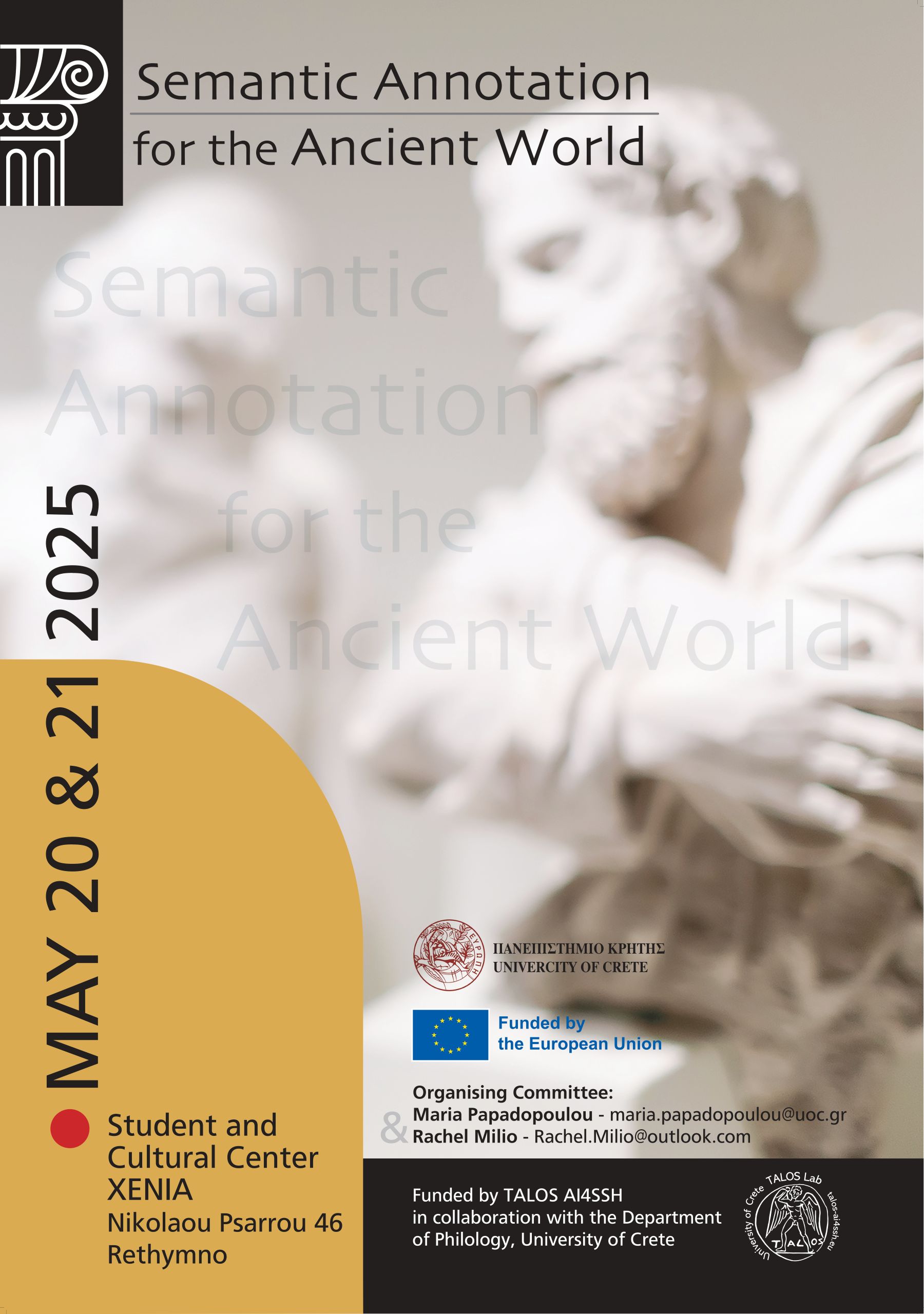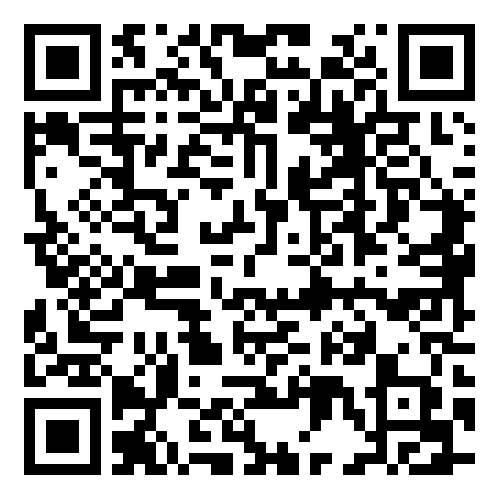
This conference will explore the contribution of semantic annotation, along with that of hybrid AI, deep learning, and knowledge graphs to ancient world studies. Semantic annotation is the process of tagging or (manually or automatically) labelling pieces of content—such as words, phrases, or objects in texts or images—with meaningful metadata to provide context and clarify meaning. Semantic annotation allows machines to process the meaning and relationships of content within a dataset, transforming raw data into structured knowledge. For example, a machine can recognize that “Athens” is a city, distinguish it from the other cities with the same name, and link it to related concepts, which improves ability to perform tasks like searching, or making inferences. By tagging concepts, entities, and relations, semantic annotation enables machines to interpret and process data more accurately, connecting data points across software, allowing for better searchability, advanced queries and further reuse via natural language processing and machine learning.
Through this conference, we hope to foster collaboration and intellectual exchange amongst digital scholars of the ancient world. According to the principles of FAIR and Linked Open Data, we strive to promote openness and accessibility in all of the workflows and methods presented at the conference.
CONFERENCE PROGRAM
Chiara Palladino (Furman University)
The fragile link: Semantic Annotation and the study of the past
Abstract
Semantic annotation is one of the most powerful tools of current digital scholarship. With the raise of machine learning and increasingly customizable language models, the ability to design and evaluate semantically classified datasets has become essential to the critical understanding of complex documents from the past. Yet, the study of the ancient world challenges semantic annotation at the very foundations. This talk explores the complexities of classifying and annotating ancient spatial documents, as an example of sources that often defy modern conceptual frameworks. The uncertainty and ambiguity of ancient geographical information, the fluidity of semantic categories over time, and the problematic alignment of ancient and modern lexicon represent some of the key challenges to the creation of semantically classified data from ancient spatial corpora.
Current research gravitates towards project-specific annotations to carry the interpretation and discursive analysis of ancient documents. However, we also need some level of interoperability through disambiguation and linking to digitized lexica, indices, and gazetteers. In fact, the specificity of the digital study of antiquity lies in the very fragile nature of the links we establish: between annotations and authorities, but also between ancient categories and modern classifications. While ontologies provide a framework for semantic annotation, the lack of documented correspondence between modern and ancient categories risks leading to data loss, but also to lack of understanding of what lies outside the standard. We argue for a theory of semantic annotation that uncovers the epistemological implications of this task, embracing fragility and ambiguity, and treating special cases not as outliers, but as tools to emphasize the inconsistencies of our knowledge systems.
Margherita Fantoli (KU Leuven)
Beyond Words: Automating Contextual Understanding in Classical Texts
Abstract
Semantic annotation of ancient texts involves two key steps: identifying meaningful tokens, mostly through their linguistic features, and contextualizing them by linking to (disambiguated) dictionaries, knowledge bases, or by labelling specific roles. This process aligns with the ancient tradition of glossing and commenting on texts, a practice central to classical scholarship. While manual annotation is labour-intensive and disambiguated corpora are rare, can we automate this process to create large-scale semantically annotated resources?
The dream of enhancing textual understanding through annotation dates back to Padre Busa, whose lemmatized concordance of Thomas Aquinas’s works laid the foundation for automated linguistic annotation. Despite the evolution of AI models, the automation of annotation of classical texts remains task-dependent, with semantic annotation—requiring extralinguistic context—posing significant challenges.
This keynote explores the potential and limitations of automating semantic annotation for ancient texts. It reviews advances in Named Entity Recognition (NER) and Linking (NEL), examines how digital resources like gazetteers and encyclopedias capture context, and considers how to integrate this knowledge into Large Language Models (LLMs). By bridging linguistic annotation and semantic enrichment, this talk envisions a future where automation enhances the semantic understanding of ancient texts, while upholding the traditions of classical scholarship.
Participation in SA4AW is free of charge!
Register for online participation here.
TRAVEL INFORMATION
Travel to Crete
The University of Crete is located in Rethymno, Crete.
Rethymno is equidistant between two international airports, Chania (CHQ) and Heraklion (HER).
Journey time from either airport to Rethymno is approximately an hour via bus. From CHQ, the KTEL bus service will bring you directly to Rethymno.
From HER, there is a smaller local bus which will bring you to the central Heraklion bus station where you can catch a KTEL bus to Rethymno.
For information on the KTEL bus schedule, visit this site.
Accommodation in Rethymno
Rethymno sees a lot of tourists in the summer months, so there are plenty of options for accommodation.
We recommend Ink Hotels House of Europe, Jo-An Palace, Achillion Palace, or Theartemis Palace, which are all centrally located in Rethymno.
Travel to Conference Venue
“XENIA”, the Student and Cultural Center at the University of Crete, is located in downtown Rethymno at Nikolaou Psarrou 46. The venue is walking distance from hotels in the city center.
For participants staying outside of the center of Rethymno, the University bus runs through the city center every twenty minutes. Tickets for the bus can be purchased at a variety of kiosks throughout the city, and cost 1,40 euro (0,70 for students). Look for the bus labelled University/Πανεπιστήμιο.
Local Information
For more about Rethymno and the University of Crete, you can visit the following sites:
- Ontology-driven semantic annotation
- Standardisation
- Multilingual annotation practices
- Automatic and semi-automatic annotation
- Annotation of ancient geography
- FAIR/LOD data
- Semantic Web
- NER for ancient Greek/Latin
- RDF-based digital editions
- Methods, tools, and platforms
CALL FOR PAPERS
IMPORTANT DATES
Assistant Professor in Digital Humanities & Classics, TALOS-AI4SSH & Dept. of Philology (University of Crete)
CONFERENCE
ORGANIZERS
PROGRAM
COMMITTEE
- Elton Barker
- The Open University
- Monica Berti
- Universität Leipzig - Institut für Informatik
- Antonis Bikakis
- University College London
- Dimitrios Bilianos
- University of Athens
- Margherita Fantoli
- KU Leuven
- Leif Isaksen
- University of Exeter
- Diane Jakacki
- Bucknell University
- Olha Kanishcheva
- National Technical University
- “Kharkov Polytechnic Institute”
- Nikos Litinas
- University of Crete
- Hiu Liu
- Nanjing University of Aeronautics
- and Astronautics
- Chiara Palladino
- Furman University
- Silvia Piccini
- Istituo di Linguistica Computazionale - CNR
- Christophe Roche
- University of Savoie
- Eirene Seiradaki
- Director of Research Partnerships,
- RBC Borealis
- Melina Tamiolaki
- University of Crete
- Wei Tong
- Peking University



